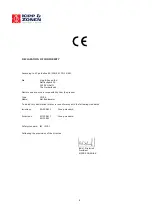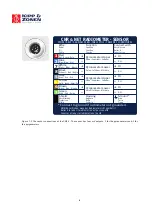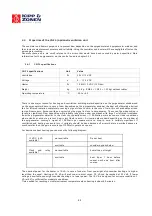
11
Temperature
[EC]
Resistance
[
Ω
]
Temperature
[EC]
Resistance
[
Ω
]
Temperature
[EC]
Resistance
[
Ω
]
-30
-29
-28
-27
-26
-25
-24
-23
-22
-21
-20
-19
-18
-17
-16
-15
-14
-13
-12
-11
-10
-9
-8
-7
-6
-5
-4
-3
-2
-1
135200
127900
121100
114600
108600
102900
97490
92430
87660
83160
78910
74910
71130
67570
64200
61020
58010
55170
52480
49940
47540
45270
43110
41070
39140
37310
35570
33930
32370
30890
0
1
2
3
4
5
6
7
8
9
10
11
12
13
14
15
16
17
18
19
20
21
22
23
24
25
26
27
28
29
29490
28150
26890
25690
24550
23460
22430
21450
20520
19630
18790
17980
17220
16490
15790
15130
14500
13900
13330
12790
12260
11770
11290
10840
10410
10000
9605
9227
8867
8523
30
31
32
33
34
35
36
37
38
39
40
41
42
43
44
45
46
47
48
49
50
51
52
53
54
55
56
57
58
59
8194
7880
7579
7291
7016
6752
6500
6258
6026
5805
5592
5389
5193
5006
4827
4655
4489
4331
4179
4033
3893
3758
3629
3504
3385
3270
3160
3054
2952
2854
Table 1.2
Resistance values versus temperature in °C of the CNR 4's thermistor.
Relatively small errors occur when the CNR 4 is not in thermal equilibrium. This happens for example when the
heater is on, or when the sun is shining. When the heater and ventilator are on, the largest expected deviation
between real sensor temperature and Pt-100 or thermistor reading is less than 0.5 degree.
The internal temperature sensors will not give a good indication of ambient air temperature; at 1000 Watts per
square meter Solar Radiation, and no wind, the instrument temperature can rise a few degrees above ambient
temperature. This will not affect the readings of the CNR 4
The offsets of both pyranometers and pyrgeometers might be larger than 5 Watts per square meter if large
temperature gradients are forced on the instrument (larger than 5 K/hr). This happens for example when rain hits
the instrument. The occurrence of this can be detected using the temperature sensor readout. It can be used as a
tool for quality assurance of your data.













































